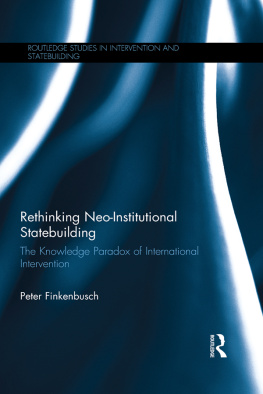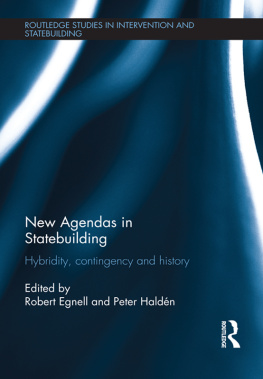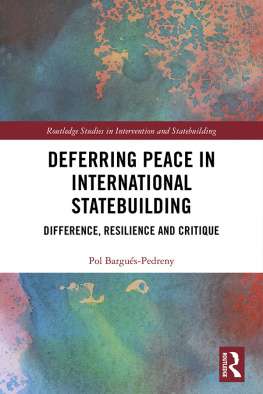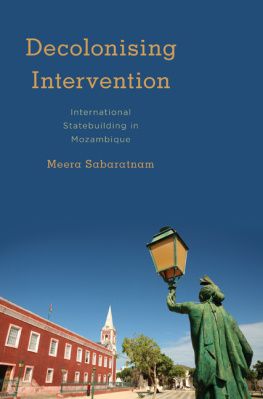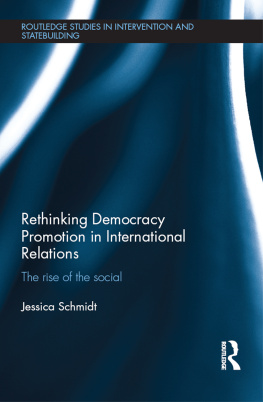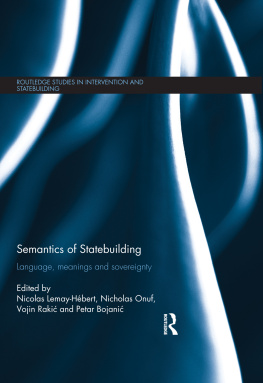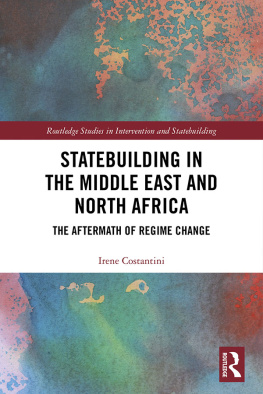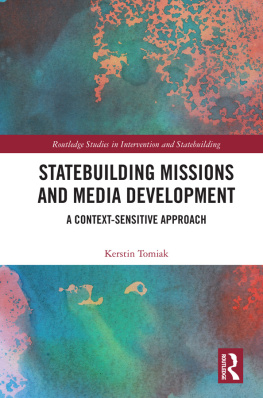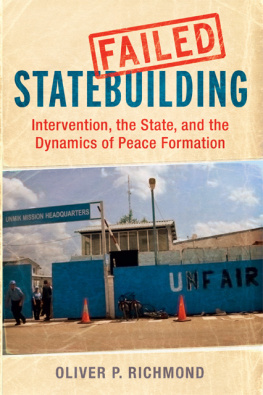Rethinking Neo-Institutional Statebuilding
This book examines how neo-institutional statebuilding undercuts international policy agency. Post-Cold War interventions are marked by a peculiar paradox. From peace and statebuilding projects in war-shattered societies to World Bank development programmes in Africa, the scope of external regulation has grown consistently while international policymakers are finding it increasingly difficult to formulate a political project regarding the Global South. This book seeks to make sense of a contradictory situation in which international policymakers are doing more statebuilding than ever while knowing less about it. The study argues that the crisis of international agency is driven by the demise of reductionist liberal-universal knowledge. It critically explores neo-institutionalism as a dominant policy framework, bringing out how the failure of intervention paves the way for more comprehensive, context-sensitive and bottom-up engagement. As a precondition and side-effect of this expansive process, reductionist liberaluniversal knowledge is deconstructed. Paradoxically, the more policymakers learn within a neo-institutional frame of reference, the less they positively know. Without this epistemic foundation, it becomes difficult to act purposively in the world and formulate instrumental policy. The study illustrates these conceptual insights with reference to the Merida Initiative, a U.S.Mexican security agreement signed in 2007.
Rethinking Neo-Institutional Statebuilding will be of much interest to students of statebuilding, international intervention, peace and conflict studies, Latin American politics and IR in general.
Peter Finkenbusch is Postdoctoral Researcher at the Institute for Development and Peace (INEF), University of Duisburg-Essen, Germany, and has a Ph.D. in Political Science from the Free University Berlin, Germany.
Routledge Studies in Intervention and Statebuilding
Series Editors: Aidan Hehir and Nicolas Lemay-Hbert
Founding Editor: David Chandler
International Intervention and Statemaking
How exception became the norm
Selver B. Sahin
Rethinking Democracy Promotion in International Relations
The rise of the social
Jessica Schmidt
The Politics of International Intervention
The tyranny of peace
Edited by Mandy Turner and Florian P. Khn
The Practice of Humanitarian Intervention
Aid workers, agencies and institutions in the Democratic Republic of the Congo
Kai Koddenbrock
Peace Figuration after International Intervention
Intentions, events and consequences of liberal peacebuilding
Gzim Visoka
Regional Intervention Politics in Africa
Crisis, hegemony, and the transformation of subjectivity
Stefanie Wodrig
Protecting Human Rights in the 21st Century
Edited by Aidan Hehir and Robert W. Murray
The Contentious Politics of Statebuilding
Strategies and dynamics
Outi Kernen
Rethinking Neo-Institutional Statebuilding
The knowledge paradox of international intervention
Peter Finkenbusch
First published 2017
by Routledge
2 Park Square, Milton Park, Abingdon, Oxon OX14 4RN
and by Routledge
711 Third Avenue, New York, NY 10017
Routledge is an imprint of the Taylor & Francis Group, an informa business
2017 Peter Finkenbusch
The right of Peter Finkenbusch to be identified as author of this work has been asserted by him in accordance with sections 77 and 78 of the Copyright, Designs and Patents Act 1988.
All rights reserved. No part of this book may be reprinted or reproduced or utilised in any form or by any electronic, mechanical, or other means, now known or hereafter invented, including photocopying and recording, or in any information storage or retrieval system, without permission in writing from the publishers.
Trademark notice: Product or corporate names may be trademarks or registered trademarks, and are used only for identification and explanation without intent to infringe.
British Library Cataloguing-in-Publication Data
A catalogue record for this book is available from the British Library
Library of Congress Cataloging-in-Publication Data
Names: Finkenbusch, Peter, author.
Title: Rethinking neo-institutional statebuilding: the knowledge paradox of international intervention / Peter Finkenbusch.
Description: Abingdon, Oxon ; New York, NY : Routledge, 2017. |
Series: Routledge studies in intervention and statebuilding | Includes bibliographical references and index.
Identifiers: LCCN 2016051960 | ISBN 9781138224339 (hardback) |
ISBN 9781315402741 (ebook)
Subjects: LCSH: Nation-building. | New institutionalism (Social sciences)
Classification: LCC JZ6300. F56 2017 | DDC 327.1dc23
LC record available at https://lccn.loc.gov/2016051960
ISBN: 978-1-138-22433-9 (hbk)
ISBN: 978-1-315-40274-1 (ebk)
Typeset in Times New Roman
by Keystroke, Neville Lodge, Tettenhall, Wolverhampton
This book has come out of a Ph.D. thesis on The Knowledge Paradox of Statebuilding at the Free University Berlin, defended in October 2014. The empirical investigation was conducted as part of a research project on Transnational Security Governance at the Collaborative Research Center Governance in Areas of Limited Statehood (Free University Berlin) from 2010 until 2013. I would like to thank Eva Brth, Yvonne Blos, Caroline Schrder, Vanessa Rau and Birte Keller, who worked as Student Assistants in that project and greatly contributed to its output. Professor Marianne Braig from the Institute for Latin American Studies provided valuable empirical insights.
Parts of the book build on Expansive Intervention as Neo-Institutional Learning, published in the Journal of Intervention and Statebuilding in 2016, and Governing through Critique, published in Globalizations in 2017. Taylor & Francis was so kind as to grant the necessary copyright permissions.
Nicolas Lemay-Hbert and Pol Bargus-Pedreny read the manuscript with time and attention, giving me useful comments. I have profited immensely from my discussions with Markus Mller and David Chandler. David prompted me to engage with a new set of questions: How do policymakers relate to the world intellectually? How do they see the world and their place in it? Markus, in turn, has helped me a lot in fleshing out the argument empirically.
Last but not least, I would like thank my family and friends. I would like to thank my friend Andreas Kellner for reading parts of the first draft and having an open ear over the years. My friend and former colleague Timo Behrens has shared the personal and professional ups and downs involved in writing an academic text of this size. My brothers Jens, Uli, and Axel and their families have shown a lot of interest in my work and always encouraged me in what I was doing. And finally, my father Jrgen who supported me all the time.
Danke.
BIO Bilateral Implementation Office
CBJ Congressional Budget Justification
CNDH National Human Rights Commission (Comisin Nacional de Derechos Humanos)

